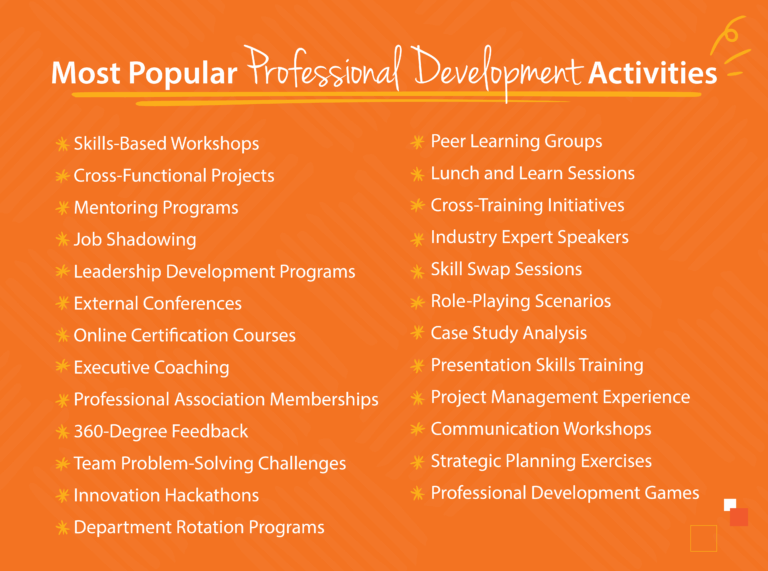Your best employees aren’t just looking for paychecks—they want career growth. When talented people feel stuck, they leave. It’s that simple.
The good news is, there’s a clear solution. Savvy HR leaders look for ways to empower employees through consistent learning opportunities, in addition to professional development plans. Targeted professional development activities—like the ones on this list—empower HR to drive retention and build a robust leadership pipeline.
What Are Professional Development Activities?
Professional development activities are structured learning experiences designed to enhance employee skills, knowledge, and capabilities. Unlike generic training sessions, these activities target specific competencies that drive both individual growth and business results.
HR should offer a wide range of professional development activities, from hands-on workshops and mentoring programs to interactive games, exercises, and cross-functional projects. The best development programs combine formal learning with practical application, so employees can immediately put their new skills to use.
Importance of Using Professional Development Activities
Organizations with strong learning cultures are 92% more likely to develop innovative products and 52% more productive than their competitors (Harvard Business Review). Yet most companies still treat professional development as an annual checkbox instead of a strategic advantage.
Done right, professional development activities deliver a measurable business impact. An effective program should improve:
- Retention: 61% of employees say learning opportunities are an important reason they’ll stay in their current role (WebMD).
- Succession Planning: High-performing organizations use development activities to identify and prepare future leaders. This best practice lowers recruiting costs and maintains institutional knowledge.
- Productivity: Upskilling employees helps them keep up with new technologies and economic pressures.
- Employee Engagement: Employees participating in regular development activities report higher job satisfaction (NIH).
25 Most Popular Professional Development Activities
- Skills-Based Workshops
- Cross-Functional Projects
- Mentoring Programs
- Job Shadowing
- Leadership Development Programs
- External Conferences
- Online Certification Courses
- Executive Coaching
- Professional Association Memberships
- 360-Degree Feedback
- Team Problem-Solving Challenges
- Innovation Hackathons
- Department Rotation Programs
- Peer Learning Groups
- Lunch and Learn Sessions
- Cross-Training Initiatives
- Industry Expert Speakers
- Skill Swap Sessions
- Role-Playing Scenarios
- Case Study Analysis
- Presentation Skills Training
- Project Management Experience
- Communication Workshops
- Strategic Planning Exercises
- Professional Development Games
Professional Development Activities and Ideas for Employees

Empower individual employees to grow their careers by offering personalized development opportunities. This approach gives everyone on your team the chance to hone their skills, grow their careers, and develop confidence.
1. Skills-Based Workshops
Skip the generic training sessions. Target the exact skills your team needs with hands-on workshops that combine learning and experience. Whether they’re practicing data analysis, project management, or communication, employees can immediately put their new skills to use.
2. Cross-Functional Projects
Use cross-functional projects to break down departmental silos. These opportunities encourage employees to develop new skills and build relationships while solving urgent business challenges.
3. Mentoring Programs
Pair your seasoned veterans with rising talent. Formal mentoring relationships transfer institutional knowledge while building the internal networks that entice people to stay. It’s succession planning disguised as professional development—and it works both ways. Your more tenured employees can also learn a lot from their younger colleagues.
4. Job Shadowing
Invite your employees to peek behind the curtain. This low-cost activity gives people real insights into various career paths while building cross-departmental relationships. It also helps employees on both sides identify new areas for professional development. Most participants walk away with a clearer vision of which skills they’d like to focus on next.
5. Leadership Development Programs
Some people are born leaders, but anyone can hone these important skills. HR and managers should identify potential leaders and offer them learning opportunities regardless of job title or tenure at the company. Build in regular assessments, formalized training, and real-life leadership challenges. These comprehensive initiatives prepare employees for bigger responsibilities and demonstrate your investment in their growth.
6. External Conferences
Industry conferences expose employees to cutting-edge trends, best practices, and professional networks. The key is selecting events that align with their individual interests with your larger organizational objectives. To maximize value, require attendees to share their biggest takeaways with the team. One conference ticket becomes company-wide learning.
7. Online Certification Courses
Give employees credentials that matter to them, to company leadership, and within the industry. Support their pursuit of industry certifications or continuing education units. Yes, certified employees can command higher salaries, but they’re also much less likely to leave when you’ve invested in their growth.
8. Executive Coaching
Invest in your high-potential talent with personalized coaching. One-on-one sessions address specific leadership challenges and career goals in ways group training simply can’t match. These programs also build stronger internal relationships, paving the way for HR and the C-suite to develop succession plans.
9. Professional Association Memberships
Industry associations provide ongoing learning and networking opportunities that build professional credibility. These memberships show you’re committed to employee growth and often lead to speaking opportunities that elevate both individual and company profiles.
10. 360-Degree Feedback
Get the full picture about employees, and then tell them what you’ve learned. HR should regularly gather feedback from supervisors, peers, and direct reports to give employees insights they’d never get otherwise. This multi-angle approach identifies strengths, skill gaps, and urgent priorities.
Professional Development Activities and Ideas for Teams
Team-based development activities strengthen collaboration while building collective capabilities. This approach creates shared learning experiences that improve group performance.
11. Team Problem-Solving Challenges
Turn real workplace problems into learning opportunities. Create collaborative challenges based on actual scenarios your teams face. This development activity builds critical thinking, teamwork, and collaboration skills.
12. Innovation Hackathons
Set a timer and challenge teams to solve business problems creatively. These intensive sessions generate fresh ideas while building collaborative problem-solving skills. Studies show that running regular hackathons increases employee productivity (National Library of Medicine).
13. Peer Learning Groups
Let employees teach each other. Self-directed learning groups build relationships and inspire employees to match each other’s skills. HR should provide the structure and resources, but let employees drive the content for maximum buy-in.
14. Department Rotation Programs
Give employees the big picture. Structured rotations through different departments reveal hidden talents and interests while building organizational understanding. These programs support comprehensive professional development goals and help employees see long-term career paths within your organization.
15. Lunch and Learn Sessions
Make learning convenient. Informal sessions during lunch breaks remove barriers to participation. A rotating cast of experts—including internal and external speakers—can cover everything from technical skills to industry trends. The casual format takes some pressure off attendees, fostering curiosity and innovation.
16. Cross-Training Initiatives
Build flexibility into your workforce. When you teach employees skills outside their primary roles, you increase operational agility, creating backup coverage for critical functions. This practical development strategy serves multiple business needs.
17. Industry Expert Speakers
Energize your team by sharing fresh perspectives. Outside experts can offer insights and best practices that inspire new ideas from a credible third-party source. Your employees get exposure to the latest industry innovations without even leaving the office.
Creative and Interactive Professional Development Activities & Games
Learning is more memorable and fun when you present it in an engaging format. These interactive approaches increase participation and long-term impact.
18. Skill Swap Sessions
Turn your employees into teachers. Have a graphic designer teach data analysts how to present their findings in a more effective way, or ask your accounting team to share their spreadsheet tips with office administrators. This peer-to-peer format encourages team members to round out their skill sets while strengthening professional relationships. It also helps them build confidence as teachers, which can have a direct impact on their leadership skills.
19. Role-Playing Scenarios
Practice makes perfect, especially for challenging situations. Create safe environments where employees can rehearse difficult customer interactions, change management conversations, or conflict resolution.
20. Case Study Analysis
Use real business challenges as learning opportunities. In this professional development activity, teams analyze actual problems and recommend solutions. Regular case study work helps employees develop their strategic thinking skills.
21. Presentation Skills Training
Strong communicators get promoted faster. Interactive workshops combine instruction with real practice opportunities and invite team members to respectfully critique each other. Better presentation skills often translate into higher leadership potential.
22. Project Management Experience
Turn chaos into clarity. Structured programs teach planning, execution, and monitoring skills that employees can immediately apply to real organizational projects. This methodology training has instant practical value for everyone on the team.
23. Communication Workshops
Clear communication prevents expensive misunderstandings. Focus training on active listening, conflict resolution, and effective written communication. These workshops improve collaboration while reducing the workplace friction that slows teams down.
24. Strategic Planning Exercises
Get employees thinking like owners. Team-based planning activities invite employees to think strategically, considering how their decisions will impact the entire company. These exercises build business acumen and deepen your workers’ understanding of company goals.
25. Professional Development Games
Make learning fun. Gamified experiences use competition to drive engagement. Races to complete a challenge, team-building exercises, and skills competitions provide an incentive to make learning stick. The competitive element drives engagement while creating memorable experiences.
How Paycor Helps You with Your Development Activities
Introducing professional development activities in the workplace can be a complex proposition. By design, it involves people at every level, in every department, with a wide variety of skill sets. To effectively manage the process, HR needs a reliable HCM software.
Paycor’s Talent Management Software serves as a comprehensive platform for HR to plan, track, and measure development initiatives. It includes:
- Talent Development tools to help you identify skill gaps, create personalized learning paths, and track progress toward development goals. The integrated approach ensures development activities align with performance management and career planning.
- Our Learning Management System streamlines professional development and lets HR track employee progress. Our unique course material offers personalized training for every member of your team, while self-paced modules fit easily into their existing workloads.
- Pulse Surveys provide ongoing feedback about employees’ engagement levels and job satisfaction. HR can use this data to design a more effective development program, tailored to meet employees’ unique needs and support their long-term goals.
- Career Management Software brings it all together, connecting development activities to specific career paths. These tools help employees envision clear growth paths and empower HR to design an effective succession plan.
Use Paycor for Your Professional Development Needs
Paycor’s integrated HCM platform streamlines every aspect of professional development. Our solution integrates every one of HR’s key priorities, streamlines admin, and gives you time back in your day, every day. With that flexibility, HR can focus on what matters most: supporting employees as they grow.
Ready to build a development program that drives long-term business results? Schedule a guided tour to get started.








